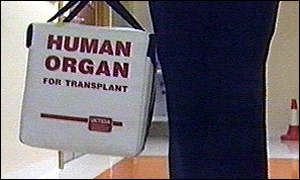
Organs for operations deal
URL: http://news.bbc.co.uk/hi/english/health/newsid_1273000/1273591.stm
Date accessed: 24 May 2001
BBC News
Thursday, 12 April, 2001, 10:26 GMT 11:26 UK
The programme at the New England Medical Center, in Boston, is thought to be the first to offer this sort of incentive to cut waiting lists.
The Department of Health said they were not considering introducing a similar scheme in the UK.
Hospital staff in Boston say the programme, which was introduced in February, is already proving a big success.
It is assigning a value to a kidney donation, and the value is
exactly a kidney. On that basis we feel very comfortable
|
|
Dr Richard Rohrer, of the New England Medical Center, in Boston
|
Susan Stephens donated one of her kidneys to a stranger in Greece to move her 13-year-old son, Corey to the top of the kidney waiting list.
Under normal circumstances Corey could have waited 18-months to get his kidney, but his operation was carried out just weeks later.
His mum said the scheme had worked well for her.
"Without this type of programme, there would be a lot of suffering."
Cut shortages
Doctors are optimistic the programme - Hope Through Sharing - will ease the shortage of donor organs.
Of the 75,000 people waiting for organ transplants in the USA each year, about 48,000 of them need a kidney and they face an average wait of three to four years in Massachusetts.
Richard Luskin of the New England Organ Bank said this could dramatically cut waiting times.
"It's really an addition to the total available pool of organs and that's why it's so important."
Dr Richard Rohrer, the chief of transplant surgery at the New England Medical Center, in Boston, said the scheme was ethical because no-one was buying or selling organs.
He said it was also a way for willing donor, who does not have compatible organs to help their relatives.
"It is assigning a value to a kidney donation, and the value is exactly a kidney. On that basis we feel very comfortable."
At the moment the scheme only applies to kidneys, but Dr Rohrer said it might be possible eventually to extend it to cover lungs and livers.
"Kidneys are primarily distributed by waiting time. Livers and lungs are distributed based on urgency and there is no dialysis.
"Figuring out exactly how to give the priority is an issue."
A spokesman for the Department of Health said a similar scheme was not on the cards for the UK.
He said rules on un-related transplant donation were very strict and that under current legal restrictions a scheme like this would be illegal.
"We are not considering taking this up, but we have a commitment to increase the number of living transplants we carry out.
"At the moment, 20% of the transplants we carry out are from live donors, but almost all of those are related to the recipient.
"But we are certainly not going to go as far as that scheme in America."
At the moment there are 4,800 people on the kidney transplant register in the UK.
Category: 4. Ethical and Social Concerns Arising out of Biotechnology, 30. Xenotransplantation, 38. Medical and Pharmaceutical Innovation